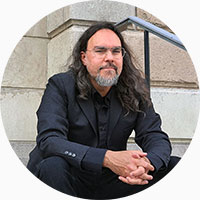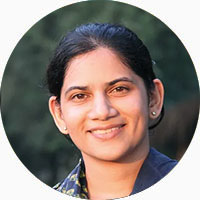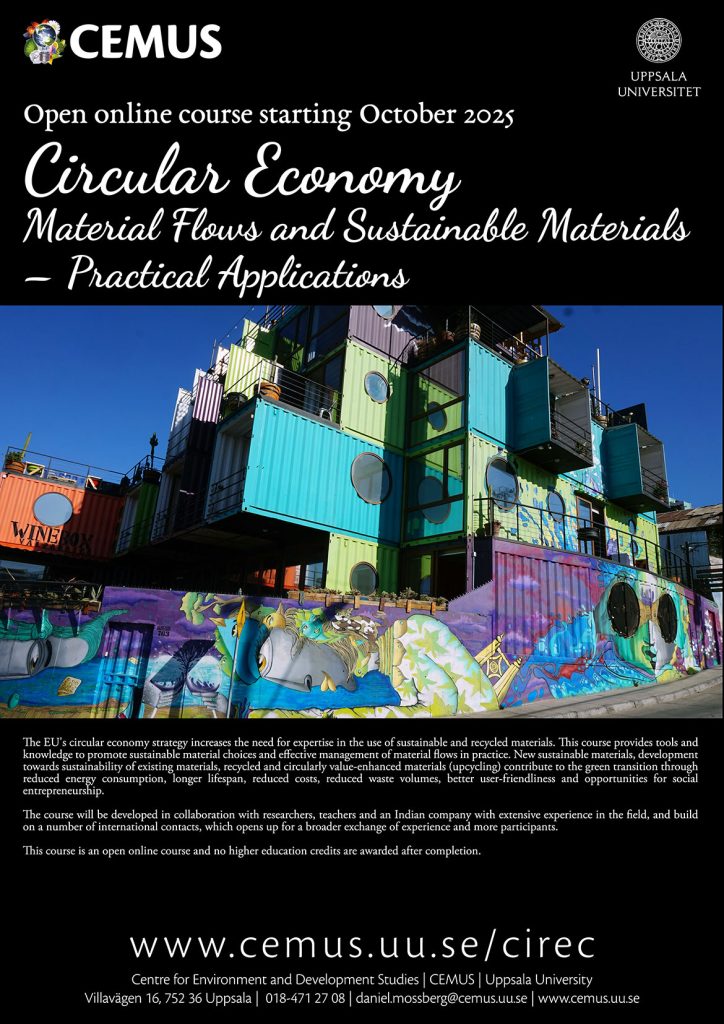Circular Economy: Material Flows and Sustainable Materials – Practical Applications
Are you a professional looking to develop new skills, looking to change careers, start your own business or a student interested in knowing more about the circular economy? Then we encourage you to sign-up for the first course-run starting October 1, 2025!
Enroll here »
Duration: 10 weeks Weekly study time: 8 hours
The EU’s circular economy strategy increases the need for expertise in the use of sustainable and recycled materials. This course provides tools and knowledge for the use of sustainable materials, development towards sustainability of existing materials, recycled and upcycled materials and how they contribute to the green transition through reduced energy consumption, longer lifespan, reduced costs, reduced waste volumes, better user-friendliness and opportunities for social entrepreneurship. The course will give you the opportunity to work on your own project in your own context and include different creative and practical tools.
The course is developed in collaboration with researchers, teachers and an Indian company with extensive experience in the field, and build on a number of international contacts, which opens up for a broader exchange of experience and more participants.
Course content
- Part 1: Introduction to the Circular Economy
Part 2: Design for Recycling
Part 3: Use of Recycled Materials
Part 4: Substitution with Sustainable Alternatives
Part 5: Conditions for Circular Systems and Economies
Course design
Open online course with pre-recorded lectures, interviews and workshops, with reading, reflection and creative assignments. Self-paced, start and finish when you want to. This course takes about 80 hours to complete.
There’s no credits awarded for this course, but you will receive plenty of knowledge and practical ways of working with the issues, and after the completion of the course you will be awarded a certificate.
You will learn
- How circular economy, material flows and sustainable materials can be understood in a broader sustainability context.
- Using various tools and models to analyze and improve material flows and product design.
- Practically apply and implement the knowledge in the course to their own business or a chosen project.
Who is the course for?
The course is aimed at professionals in industry, waste management, construction, material production, product development, recycling solutions, local and regional government, design and different creative professions. It is also open to students on all levels and participants without an academic background who want to deepen their knowledge in circular economy and sustainable material choices.
Contact and lead educators
Please contact Daniel Mossberg, daniel.mossberg@cemus.uu.se, with your questions.
 Daniel Mossberg Lead Outreach and Educational Coordinator CEMUS, Uppsala University
Daniel Mossberg Lead Outreach and Educational Coordinator CEMUS, Uppsala UniversityDaniel works as lead outreach coordinator and educational coordinator at CEMUS with a wide range of first-hand experience of student-led education, developing new, interdisciplinary courses and programs, open events in collaboration with different partners, creative projects with focus on local sustainability, critical conversations on current and existential issues, open online courses on climate change leadership and much more. He has worked as course coordinator, director of studies, deputy director, with an academic background in cultural anthropology, philosophy, American studies, environment and development studies and climate and sustainability studies. Engaged as student, staff and union representative over the years, and now safety representative at CEMUS.
daniel.mossberg@cemus.uu.se
073-065 02 28
 Sonali Phadke Partner and Creative connections studio Alternatives
Sonali Phadke Partner and Creative connections studio AlternativesSonali comes with an engineering background and her family business in composites and plastics triggered her initial interest in reusing waste. Also, an alumni of The Ecological Society Pune has been a resource person for many environment/socio-economic projects and surveys. She has been an active member of Oikos for Ecological Services and was a part of the Maharashtra Environment Department-funded project on Eco-Education. She is also a team member of the Grassland Trust that works in grassland conservation from both the aspects of human and wildlife concerns. With her background, Sonali brings in the aspect of sustainability from the ecological perspective in the studio’s work.
CEMUS, Uppsala University
The Centre for Environment and Development Studies (CEMUS), is a student-initiated, interdisciplinary centre at Uppsala University, with the explicit ambition to contribute to a more just and sustainable world. Student-faculty collaboration weaves as a golden thread through the history and organization of all activities at the centre.
Since its inception in the early 1990’s, the centre has initiated and expanded the space for transdisciplinary student-led higher education as well as research and collaboration that transcends traditional academic disciplines and boundaries between academia and society at large.
Read more: https://www.cemus.uu.se/about/
Uppsala University
Founded in 1477, Uppsala University is Sweden’s first university and one of Northern Europe’s oldest. As a leading comprehensive research university, it is committed to advancing knowledge and conducting research that makes a real difference. The university consistently ranks among the top 100 in the world, a testament to its high-quality education and research.
With over 50,000 students and 7,600 employees, Uppsala University offers a vibrant and diverse academic environment. Its broad range of academic disciplines and global collaborations contribute to solving complex societal challenges.
Read more: https://www.uu.se/en/
studio Alternatives
studio Alternatives is a multifaceted firm working in the areas of creative reuse and design. We have our own workshop with highly skilled and trained craftsmen. In addition to design consultancy, we also execute all scales of projects, products, furniture, accessories, artifacts, installations and customised space-making elements. We believe that along with an interesting and unique concept, it is equally important to have the ability to deliver excellent detailing and very fine quality work.
We love upcycling. Utilising various types of discarded materials to create desirable objects has been our passion. We have been working on upcycling of discarded materials since 2010 and have worked with a varied range of discarded materials such as packaging, thermocol, foil wrappers, glass bottles, tires, plastics, fabric, wood and metal, to name a few. To put it in a nutshell, our work with reclaimed materials, ranges right from coasters to large shipping containers.
Till date, we have executed a vast array of projects such as upcycled shipping container spaces, complete interior design with the theme of upcycling and designing of corporate gifts from discarded materials. Some of the most meaningful projects were those where we could design and make useful furniture/artefacts from the clients’ own discarded materials.
Read more: https://www.studioalternatives.com/

